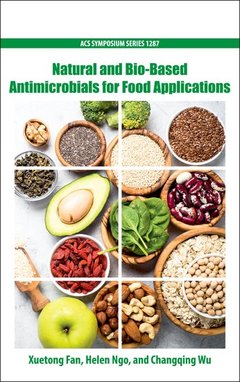Description
Natural and Bio-Based Antimicrobials for Food Applications
ACS Symposium Series
Coordinators: Fan Xuetong, Ngo Helen, Wu Changqing
Language: English
Subject for Natural and Bio-Based Antimicrobials for Food Applications:
Publication date: 06-2019
262 p. · 16x23.5 cm · Hardback
262 p. · 16x23.5 cm · Hardback
Description
/li>Biography
/li>
It is estimated that foodborne microorganisms in the United States cause 48 million sicknesses, 128,000 hospitalizations and 3,000 deaths each year. Food spoilage due to decay-causing microorganisms is also an issue in both developing and developed countries with 30-40% annual loss of fruits and vegetables. Synthesized antimicrobials (preservatives) are commonly used by the food industry to enhance microbial safety and increase shelf-life. However, food and agricultural industries are experiencing a lack of potent antimicrobial agents to secure the safety and maintain the quality of food products. Some synthetic preservatives may produce harmful by-products and damage the environment. There is also increasing incidence of antibiotics-resistant pathogens which has drawn great concern from the scientific communities and public health professionals. Therefore, there is increasing interest in the use of natural antimicrobials to enhance microbial safety, reduce spoilage and extend the shelf life of food. Natural antimicrobials are from plants, microorganisms and animals. They cover a wide variety of compounds including phenolics, terpenes, bacteriocins, peptides, proteins, natural polymers, fatty acids (lipids), and organic acids. Overall reviews of well-known natural or bio-based antimicrobials are first presented. The book then discusses antimicrobials of plant sources and their applications in foods and animal health. A number of chapters address the combinations of natural antimicrobials with non-thermal processing technologies to achieve additive and synergistic effects. The use of natural antimicrobials in packaging and coating, as well as both well-studied and novel biobased antimicrobials are discussed. Furthermore, the needs for toxicological evaluations of natural and bio-based antimicrobials are presented and protocols are recommended. Moreover, there is discussion in many of the chapters on the modes of action, mechanisms, and industrial aspects of applying natural or bio-based antimicrobials.
Dr. Xuetong Fan serves as a Lead Scientist and Research Food Technologist at USDA, ARS, Eastern Regional Research Center, Wyndmoor, PA, where he works on projects involving development of interventional technologies to enhance microbial safety of food. Dr. Fan functions as a project leader in the area of food quality and chemistry, develops/modifies food safety intervention technologies and treatments (including natural and bio-based antimicrobials), evaluates their effects on pathogen reductions and all aspects of food quality (appearance, texture, nutritional, chemical and sensorial quality) and develops innovative research approaches to minimize quality loss and accumulation of undesirable chemicals. Dr. Fan has over 25 years research experience in the fields of food quality and safety, food irradiation, postharvest physiology, controlled and modified atmosphere storage, and nonthermal processing technologies. Dr. Fan has authored and co-authored over 300 scientific publications, which consist of more than 150 peer reviewed scientific articles, >50 book chapters/proceedings, and >100 abstracts, and co-edited four books. Dr. Helen Ngo serves as a Research Chemist at USDA, ARS, Eastern Regional Research Center, Wyndmoor, PA. Her research interest lies at the interface between inorganic and organic chemistry with a particular focus on designing highly efficient and environmentally benign catalysts. She is a team leader on the projects in developing new technologies and materials from farm products. The impact of her work has resulted in cooperative agreements with national and international companies. She is the recipient of the USDA's Early Career Scientist of the Year award in 2010 and American Oil Chemists Society's Young Scientist Research award in 2014. To date, Dr. Ngo has authored and co-authored over 50 scientific papers, 2 book chapter, 3 U.S. Patents, and 2 patents pending. Dr. Ngo has also authored over 30 scientific abstracts for oral technical presenta
© 2024 LAVOISIER S.A.S.

